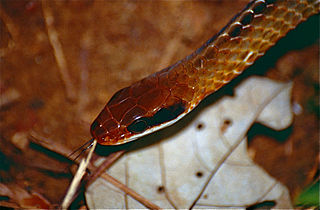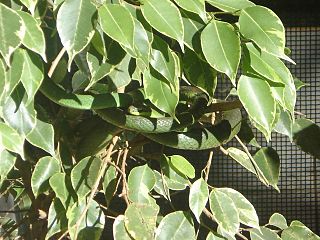
Vital Brazil Mineiro da Campanha, known as Vital Brazil, was a Brazilian physician, biomedical scientist and immunologist, known for the discovery of the polyvalent anti-ophidic serum used to treat bites of venomous snakes of the Crotalus, Bothrops and Elaps genera. He went on to be also the first to develop anti-scorpion and anti-spider serums. He was the founder of the Butantan Institute, a research center located in São Paulo, which was the first in the world dedicated exclusively to basic and applied toxicology, the science of venomous animals.

Chironius scurrulus, commonly known as the smooth machete savane, is a large slender colubrid snake. It is also known as Wagler's sipo.

Chironius carinatus, commonly known as the Amazon coachwhip, is a long and slender, nonvenomous colubrid snake.

Chironius is a genus of New World colubrid snakes, commonly called sipos, savanes, or sometimes vine snakes. There are 23 described species in this genus.
The Saint Vincent blacksnake, also commonly known as the Saint Vincent coachwhip, the San Vincent racer, and Vincent's sipo, is a species of snake in the family Colubridae.

Bothrops brazili is a venomous pitviper species endemic to South America. There are no subspecies that are recognized as being valid.
Raymond Ferdinand Louis-Philippe Laurent was a Belgian herpetologist, who specialized in African and South American amphibians and reptiles. He published more than 200 scientific articles and book chapters. Several species have been named after him, most recently Phymaturus laurenti in 2010. Additional species of reptiles named in his honor include Chironius laurenti, Liolaemus laurenti, and Mehelya laurenti.

Chironius laurenti is a species of nonvenomous snake in the family Colubridae. The species is native to Bolivia and Brazil. The species was named in honor of Raymond Laurent.

The brown sipo is a species of snake of the family Colubridae.

Drymoluber is a genus of New World snakes of the family Colubridae.
Rhachidelus is a genus of snake in the subfamily Dipsadinae of the family Colubridae. The genus is endemic to South America.

Chironius bicarinatus, the two-headed sipo, is a species of snake in the family Colubridae. The species is found in Brazil, Argentina, Uruguay, and Paraguay.
Chironius diamantina is a species of snake in the family Colubridae. The species is endemic to Brazil, in the state of Bahia.

Chironius foveatus, the South American or coastal sipo, is a semi-arboreal species of non-venomous snake in the family Colubridae, found in Brazil. It primarily inhabits the southern and eastern coastal regions of the country, such as the states of Bahia, Santa Catarina, Espírito Santo and Rio de Janeiro, as well as the municipalities of Rio Fortuna and Ilhéus. It has also been observed on Ilha Grande.
Chironius gouveai, Gouvea's sipo, is a species of snake in the family Colubridae. The species is endemic to Brazil, in the state of Rio Grande do Sul.
Chironius laevicollis, the Brazilian sipo, is a species of colubrid snake from Brazil. This species is endemic to the Atlantic Forest along the country's southeast coast, and is common and widespread throughout its range.
Chironius maculoventris, the central sipo, is a species of nonvenomous snake in the family Colubridae. The species is found in Argentina, Paraguay, Bolivia, and Brazil.

Chironius quadricarinatus, the central sipo, is a species of nonvenomous snake in the family Colubridae. The species is found in Brazil, Paraguay, and Bolivia.
Chironius spixii is a species of nonvenomous snake in the subfamily Colubrinae of the family Colubridae. The species is native to northwestern South America.










